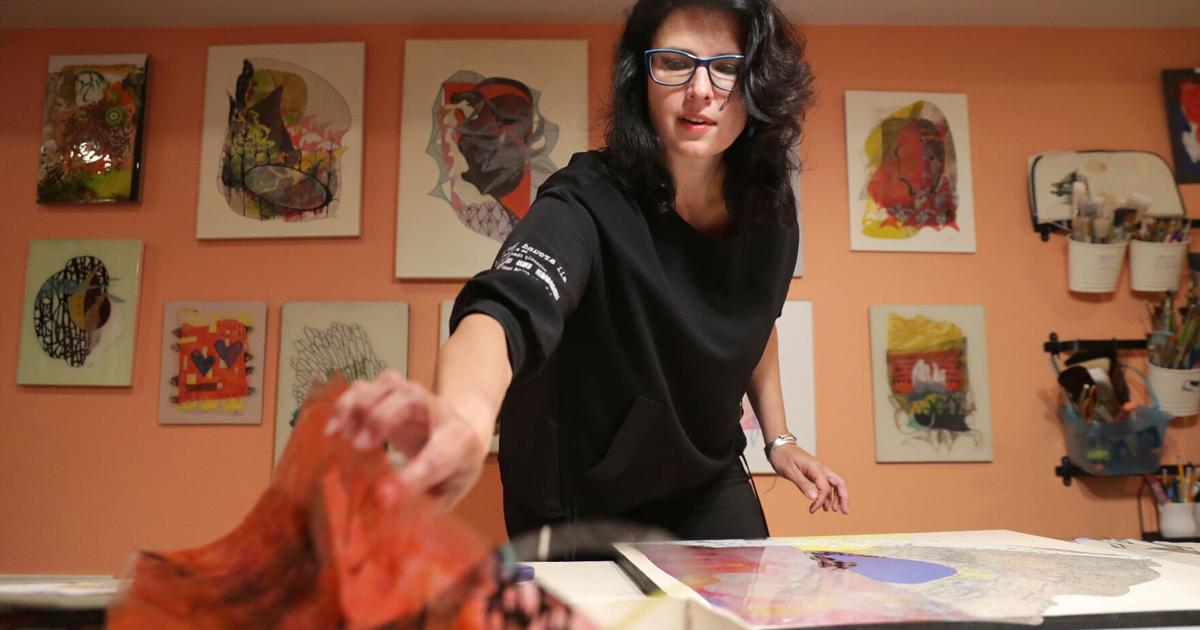
Ukrainian artist designed RED and Jacknife in bold way | Arts and Theater
As an only child with devoted parents, artist and interior designer Anastasiya Chepil Craig, who often goes by “Nastia,” fondly recalls her childhood in Ukraine.
Her parents sought the best education for her, and when she displayed interest in art or music or languages, they got her lessons.
Craig, 41, who designed the bold, contemporary interiors of RED sushi and its sister restaurant, Jacknife, two of the most distinctive places to dine in Madison, as well as the new Forage Kitchen in Middleton, said she became interested in art when she was 11. Her parents, she said, gave her opportunities to study with talented teachers.
“I’ve been really nostalgic about my hometown, which is Odesa. It’s on the Black Sea. It’s just a really, really beautiful place. It’s considered to be a resort town,” Craig said.

Anastasiya Chepil Craig runs her business, Pink House Designs, and produces her colorful, abstract collage art out of her pink house on Lakeside Street.
Odesa has a unique culture, and its people have unique personalities, she said. “I definitely miss that.”
People are also reading…
It was hard to leave home, she said, and she typically goes back every summer with her daughter, Ilyana, 11. She said she’s sad to miss returning this year because of the war with Russia.
Craig, whose ex-husband, a native Wisconsinite, lives in Madison, said she’s taken Ilyana to Odesa since she was 4 or 5, and they stay for a few weeks. Her parents, who have remained in Odesa, usually visit them each winter.
She came to the United States at 17 to study interior design at Cazenovia College in upstate New York, 20 miles southeast of Syracuse. After two years, she transferred to New York Institute of Technology, where she got her bachelor’s degree.

Artist Anastasiya Chepil Craig typically goes home to Odesa, Ukraine, every summer, but won’t be returning this year due to the war with Russia.
Craig said she studied abroad because interior design was not as prominent in Ukraine. The United States offered better opportunities, so she stayed.
She runs her business, Pink House Designs, and produces her colorful, abstract collage art out of her pink house on Lakeside Street on Madison’s South Side.
“My dream actually has always been to be an artist. I’ve always been creative … being a designer gave me an opportunity to be in the creative field and create visual experiences for people,” she said. “I felt like it would be a little bit more reliable rather than being an artist.”

I’m wondering what came first, the pink house that you live in, or the name of your business?
It was definitely the house. … I did not want to choose my own name. Maybe it would’ve been easy in some ways, but people always have a hard time pronouncing it.
When you bought the house was it already pink?
It was already pink. I didn’t choose that color.
Did you buy it because you liked the color? Was that part of your decision-making?
No, it was not, actually. I did not quite care for it in the beginning. Not because I don’t like bright colors because I do, it’s just that one would not be probably my choice. I would probably choose something a little raspberry, let’s say. But over time, it just really grew on me, and I liked how it was sort of distinct in the neighborhood and people always use it as a landmark.
What is it like for you to have your parents staying in Odesa and worrying about their safety?
It’s kind of hard to even put in words. First of all, sometimes I still feel like this whole war, it’s like a bad dream, like I’m going to wake up or something and this really is not happening because it’s just so unbelievable what’s going on there in this day and age. Of course, I worry like crazy. I’m happy that Odesa is at least not in the midst of the most fighting, but they do try shelling. They do try to throw missiles every single day. They do have a pretty good air defense system. So, most of the missiles get destroyed before they hit their target. But my parents, they hear air raid sirens every single day, sometimes a few times a night, so they have to wake up and go where it’s safer, so they don’t get to sleep a lot. They’re very tired. They’re constantly on the lookout, but at this point they’re already used to it, which I know sounds crazy, but the human brain, it gets used to everything, the human kind of experience.
Tell me more about what life has been like for them.
They have at least water and electricity and other things. They don’t have gasoline now (because of Russian strikes and panic buying). So, the driving is very, very limited right now. It’s been horrible. They are still there and they still refuse to leave, actually.
Could you bring them here?
I could, but they are still refusing, to be honest. … My mom has a business that is really struggling right now … but she’s doing what she can to save it. There’s a lot of people who work for her that she feels responsible for, including my cousin. He’s helping her with the business. She just doesn’t want to leave him on his own. And my dad’s health is not really good. So, it’s hard for him to move at this point.
What is your mom’s business?
She has a business where they sell eyewear, like glasses, and also a line of medical supplies and things like that.
How many other friends and family do you still have in Ukraine?
Well, everyone besides my daughter. I don’t have any family here. I’m the only child, but I have cousins, and uncles, their kids. Everybody I grew up with, they’re still there.
How often do you communicate with your parents?
Either every day or every other day. Usually, we don’t go without talking more than one day.
Is it hard for you to get through?
Most of the time? No. The quality of the call can be pretty bad now. But most of the time it’s working fine, which is so amazing. I’m so grateful that we have the modern methods of communication that were not available when I came to this country.
